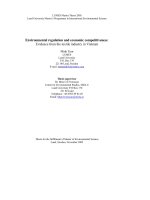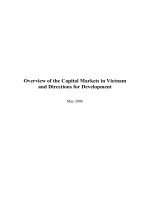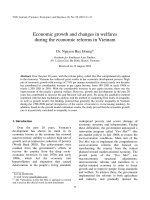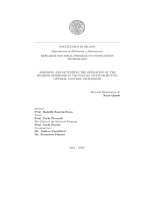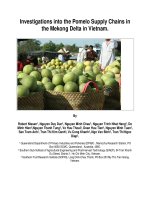The job stress in aircraft service international in vietnam airlines caterers
Bạn đang xem bản rút gọn của tài liệu. Xem và tải ngay bản đầy đủ của tài liệu tại đây (1.14 MB, 41 trang )
UNIVERSITY OF ECONOMICS HO CHI MINH CITY
International School of Business
------------------------------
Gian Hong Phi
THE JOB STRESS IN AIRCRAFT
SERVICE INTERNATIONAL IN
VIETNAM AIRLINES CATERERS
MASTER OF BUSINESS ADMINISTRATION
Ho Chi Minh City – 2019.
1
UNIVERSITY OF ECONOMICS HO CHI MINH CITY
International School of Business
------------------------------
Gian Hong Phi
THE JOB STRESS IN AIRCRAFT
SERVICE INTERNATIONAL IN
VIETNAM AIRLINES CATERERS
MASTER OF BUSINESS ADMINISTRATION
SUPERVISOR: Dr. Nguyen Phong Nguyen
Ho Chi Minh City – 2019
2
SUPERVISOR’S REPORT ON THE THESIS PROPOSAL SUBMITTED
FOR DEGREE OF MASTER of BUSINESS ADMINISTRATION
The thesis proposal title: THE JOB STRESS IN AIRCRAFT SERVICE
INTERNATIONAL IN VIETNAM AIRLINES CATERERS
Student Name: Gian Hong Phi - Student ID: 22150050
Supervisor: Dr. Nguyen Phong Nguyen
1. General comments:
Remarks on the student’s attitude:
…………………………………………………………………………………………
………………………………………………………………
Remarks on the assignment’s academic quality:
…………………………………………………………………………………………
………………………………………………………………
2. Overall assessment:
Meet requirement for submitting
Not meet requirement for submitting
3. Other remarks:
Did the student follow the report schedule?
Yes
No
Other………………………….
The Turnitin plagiarism percentage:
Supervisor’s signature
3
Table of Contents
1. Background: ................................................................................................................ 6
1.1.
Company background: ........................................................................................ 6
1.2.
Symptoms: ............................................................................................................ 6
1.3.
Initial cause effect map:....................................................................................... 9
1.4.
Update cause effect map:................................................................................... 19
1.5.
Potential problem of interest: ........................................................................... 22
2. Problem Justification ................................................................................................ 23
2.1.
Central problem definition................................................................................ 23
2.2.
Problem existence: ............................................................................................. 23
2.3.
Problem importance: ......................................................................................... 25
3. Causes validation and solutions: ............................................................................. 27
3.1.
The Real Causes of Central Problem List: ...................................................... 27
3.2.
Set of solution: To find my solution used and running to following ............. 28
3.3.
Recommend solution: ........................................................................................ 32
References: ....................................................................................................................... 39
4
Executive summary
In a long time, Aircraft Services International section (ACSI) in Vietnam Airlines
Caterers (VACS) is known as a section with high number of staff leaving the job,
especially in new employees. However, the situation become worse in recent years. As a
result, ACSI is always in lack of manpower situation. In the contrast, the number of
international flights has increasing dramatically in same time. Therefore, VACS should
recruit new employees for ACSI continuously. The high turnover rate is not only
increasing the cost for company but also reducing the quality services of ACSI.
By using the interview method, some main reasons for this problem are listed: the job
stress, the job dissatisfaction and dissatisfied in career development. However, because of
the limitation of this thesis, as well as the possible of the solutions, this thesis will focus
on the job stress factor, which is already as a result of various minor causes. For example:
poor management skills, job dissatisfaction… By providing some potential solutions for
reducing the job stress, it is expected to decrease the turnover rate as well as to improve
the working environment in ACSI.
5
1. Background:
1.1.
Company background:
Vietnam Airlines Caterers (VACS) is a company processing inflight meals and providing
catering services to airlines at Tan Son Nhat International Airport since 1993. Vietnam
Airline Caterers is also a subsidiary and head catering quarter of Vietnam Airlines. After
24 years of growth, Vietnam Airlines Caterers has been received many certificates and
awards. For examples: ISO9001:2008 Certificate, HACCP Certificate, The Catering
Award "Best Performance of 2016" from Asiana Airlines… Vietnam Airline Caterers
now is the largest airline caterer company in Vietnam and provides about 23,000 meals
per days for both Vietnam Airlines and 22 international airlines in Tan Son Nhat
International Airport.
1.2.
Symptoms:
In Vietnam Airlines Caterers, the Aircraft Service International section (ACSI) of
Operation Department is responsible for loading the in-flight meals for international
airlines. According to manager of this section, the ACSI had a high turnover rate in
recent years. However, the problem became more serious since last year, when the
number of international flights has increased dramatically. For more detail, the ACSI now
is lack about 10 staff to cover all the operation activities and fulfill all the days off for
employees. At the moment, over 50% employees are new persons, who have less than 2
years working in company.
6
After collecting the data from company, a report of turnover rate in ACSI are made by
myself. However, because of the limitation of data, in the thesis, I will choose the time
from May 2015 to May 2017, when I begin working in VACS, and this is the time having
the high turnover rate in ACSI.
In this period, the flights of present customers and new customers have increased
dramatically. For example:
-China Southern increased from 2 flights/day to 7 flights/day
-Eva Airlines and Korean Air increased from 2 flights/day to 3 flights/day
-All Nippon Airways and Philippine Airlines added 1 more flight per day.
-China Air, Cathay Pacific and Singapore Airlines added more flights per weeks
-New customers are Turkish Airlines, Hongkong Airlines, Jetstar Airways, Air New
Zealand and Xiamen Airlines. Each airline is operating about 3 to 7 flights per week.
Totally, the numbers of new flights increased about 103 flights per week. According to
meal daily report from Production Department last week, the number of international
flights now about 250 flights per week. It means there are increased from 150 per week in
2015 to 250 flights per week in the present. It is about 67% increasing in 2 years. In the
contrast, the total of employee in ACSI increased from 41 in 2015 to 47 official staff in
the present. It is only about 15% increasing in 2 years.
7
Table 1.1: The increasing of flights per week and number of ACSI staff
May - 2015
May – 2017 % Increase
Flights per week
150
250
67%
ACSI Staff
41
47
15%
Compared increasing
250
150
41
47
MAY 2015
MAY 2017
Flights/Week
ACSI staff
After collecting the data, the statistical analysis of the turnover rate in ACSI section is
about 21.2% from 2015 to 2017, while the turnover rate of employees who leave after
less than 1 year is about 71%. which is explanation by the calculation below:
Calculation of turnover rate:
𝐓𝐮𝐫𝐧𝐨𝐯𝐞𝐫 𝐫𝐚𝐭𝐞 𝐟𝐨𝐫𝐦𝐮𝐥𝐚 =
Employee separations for the period
Average number of the employee during the period
Employee separations for the period from May – 2015 to May – 2017 are 25
Average number of the employee during the period
8
-
May – 2015: 41 employee
-
May – 2017: 47 employee
Average number of the employee during the period: (41+47)/2 = 44
Turnover rate: 25/44 is nearly 57%
According to Nahar, Islam (2), the acceptable turnover rate is about 25%, but for the low
skill job like on ACSI, the turnover rate can be exceeding 50% normally (6). The
turnover rate for ACSI employee is nearly 57% and this rate is extremely high. Moreover,
the number of flights also increases 67% from 2015 as mentioned above. These factors
lead the result that the ACSI managers are impossible to ensure having enough
manpower for operation activities daily, as well as schedule enough the day off and
vacation for all employee. Therefore, employee in ACSI sometimes have only 3 days off
in a roster - 2 week. The situation has become so serious that company decided to pay
money for permission days for all employee in ACSI in 2016, because the manager
reports that he could not handle to set up permission days for his staffs. This situation is
still serious in the present, and it is predicted by the ACSI manager that company should
pay money for the permission days on 2017.
1.3.
Initial cause effect map:
In order to preparing the initial cause effect map for the reason of high turnover, some
short interviews are conducted with 2 present staff and 3 formers staff in ACSI.
Table 1.2: List of interviewees
9
ORD
Name
Year of
Length of
Leaving
Service
Education Position
1
Nguyen Thanh Ki
Bachelor
Staff
Not
3
2
Nguyen Le Anh Quang
Bachelor
Staff
Not
2
3
Nguyen Hong Bang
Bachelor
Staff
2017
1
4
Tran Quoc Vinh
Bachelor
Staff
2016
4
5
Nguyen Hoang Duy
College
Staff
2016
8
After conducting with them, some their reasons and opinions are shown in below table.
Table 1.3: Cause of high turnover rate
Name
Main reasons
Nguyen Thanh Ki
Details
1. Imbalance work life
-Imbalance work life
-Lack of day off
-Job stress
2. Job stress:
-Poor communication
-Heavy workload
among other sections
-Unfair treatment
Nguyen Le Anh Quang
-Imbalance work life
1. Imbalance work life
-Job stress
-Unstable working time
-Limited career growth
2. Job stress:
-Low salary
-Heavy workload
10
3. Limited career growth
-Long time to get promotion
Nguyen Hong Bang
1. Low salary:
-Limited budget
2. Job stress:
-Low salary
-Heavy workload
-Job stress
-Rude and strict behavior
-Unexpected job
from supervisors
3. Unexpected job:
-Not match as their thinking
-Hard working environment
Tran Quoc Vinh
-Lack of motivation from
1. Job stress:
manager
-Heavy workload
-Lack of recognition
-Job stress
Nguyen Hoang Duy
-Negative health effect
1. Negative health effect:
- Lack of motivation from
-Working outdoor in bad
manager
weather
-Lack of recognition
-High noise from airplanes
11
Firstly, I want to explain the job of an ACSI staff in Vietnam Airline Caterers. An ACSI
staff is responsible to check and ensure all the in-flight meals and equipment matching
with the standard requirement. After checking, he will load all the meal carts to the truck
and transport it from company to the airplane with a driver. At the airplane, he will install
the new carts to in specific places inside the cabin and off-load the old cart from the
airplane. Finally, he will confirm the meals with cabin crew. Moreover, the staff is
responsible to prepare the equipment for next flight. They need to clean all the glasses
and chinaware items and set up them in the carts. This is a manual work and hard job.
According to Ki – who has 2 years’ experience – complains that he has more work in a
shift than in the past and this heavy workload makes him stress. For details, he explains
that ACSI should need operating continuously 24/7, therefore it has many shift working
time and a shift time is only 8 hours. A staff in his working time will be assigned workto-do by a Team leader. In the past, a staff would prepare and load in-flight meals for
only 1 large flight or 2 small flights a day. However, because lack of staff in recent time,
a staff now should load meals for 2 large flights or 4 small flights a day. Although
company tried to hire many new employees in one time, but many new employees quit
after training time, while other old staff decided to quit the job too. The increase of flights
and lack of staff force them to service more flights in a shift than before, and need to
work overtime to complete everything. As a result, the employees feel extremely tired
after work, and require more time to restore energy.
12
Although ACSI is lack of manpower, the unfair treatment in set up work in a shift time is
making the situation worse. The ACSI section now includes 1 manager, 4 Supervisors
and 8 Team-leaders. Ki explains that in a shift time (AM shift or PM shift), it is only 1
Team-leader is responsible for prepare assignment table for all staff in shift time, the
other team-leaders in that shift should work like a normal staff. However, the on-duty
team-leader will affair the other team-leaders and will assign them less work than other
team members in the same shift time as usual. It means that the other staff in that shift
should do more work because of this unfair treatment and they feel more stress at work.
Ki confesses that it is difficult to report this situation to the manager or to change this
“traditional treatment”.
In addition, Quang complains about the unstable time shift, which makes him feel stress
and have an unhealthy work-life balance. He knows that as a shift employee, he should
adapt the flexible working time. But the changing from day shift to night shift affect a lot
in his routine, because the body cannot properly adjust to the sleep pattern changes. He
explains that with early day shift, he usually sleeps early on night, and wakes up early in
the morning to begin a new day. However, when he changed to nigh shift time, he should
go home late at the midnight and it is hard to sleep at this time. Moreover, because he
sleeps late, he wakes up late and cannot go to eat breakfast with his girlfriend. It means
many habit in daily life need to be changed to adapt the new working time. The other
staff agreed with Quang’s opinion that the changing of time sleep is the most difficult
part, and it do not affect only to their daily life, but also affect to their health as well as
13
their work performance. Moreover, another factor can affect to their working time is
delayed flights. When they have delayed flights, if they cannot pass the flight for other
staff, they need to work overtime to wait these flights. The flights have many reasons for
delayed (maybe for heavy rain, for storm, bad weather, problem with machine…).
Therefore, most of the delayed flights are unpredictable. Quang and Ki complains that
they missed some appointment with their friends, or need to change his plan
unexpectedly because of these delayed flights. However, because delayed flight is a part
of this job, they accept to work overtime for this. But it is still annoying.
In addition, another influence affect to their routine is about day off. Many young
employees in ACSI confess that they cannot use permission leave because they lack of
manpower in section now. In more detail, they explain that the schedule time of their
section is prepared for 2 weeks. Therefore, each employee has 4 days off in a roster. They
can book the day off in next roster by mail to the manager before last Saturday in old
roster. However, sometime they have only 3 days off in a roster because of lacking
employee. Last year, company decided to pay money for permission days for all
employee in their section, because their manager reports that he cannot handle to set up
permission days for his staffs. As a result, they can only use the standard day off. If they
need 4 days off or more for personal reason, they need to save the days off in this week
and use it in next week. It means that they should work continuously 10 days or more to
get 4 days off. Most of them agree that they feel tired and exhausted when they are
working continuously day by day in a long time like this.
14
In addition, Bang describes that this job is an on-the-job-training, the new comer like him
will be instructed directly by old staff. But the old staff now are extremely busy with their
job in working time, so they are lack of time to train new comer carefully. For more
detail, Ki confesses that as a trainer, he will need more time to explain carefully for new
comers about the procedure and how-to-do the job. But he still should do his own work
on the shift, which are already very heavy. Thus, many old staff avoid to train the new
comer or cannot train them carefully as in the past. After one-month training, the new
employees need to prepare and load the inflight meals by themselves. However, as a
result of unwell training, they are poor working skill staff and usually make many
mistake in working and need other co-workers help them to fix the problem. The old staff
usually feel stress when are in a shift with many new employees like that.
Another result of unwell training is the rude and strict treatment from team leaders and
supervisors. The new unwell-training-employees are usually make the mistakes on
working, and it can make the flights delayed or received the complaints from customers.
Therefore, the on-duty team-leaders and supervisors, who will be taken responsible and
be disciplined for the complains in their shift, treat them very strictly. If a new employee
makes a serious mistake, he will be blamed harshly by team-leader or supervisor. Quang
confirms that another new employee quitted the job last month because he could not
stand the pressure and negative feeling in working environment. Quang also confesses
that the strict treatment makes him feel stress and sometime want to quit the job,
especially when he has blamed harshly from team-leaders.
15
In the other side, Quang gives another reason for turnover intention. He complains that
although there are many team-leaders in ACSI, the way to choose the new team-leaders is
unclear. The new team-leaders are decided by managers of Operation Department and
ACSI section, and a staff also needs a long time to get first promotion – about at least 5
years. Thus, he is dissatisfied with career development in section now. Besides that, the
low salary and compensation is also another dissatisfaction factor, which motivates him
to find a new job. Furthermore, Ki presents another internal problem in company. He
explains that the other section in Operation department or in Production department have
their own internal problem. Thus, sometimes they cannot work well and smoothly with
ACSI and this can lead to a serious mistake, such as making a flight delayed. However,
when it has a large mistake or complain, no one wants to take the penalize for this, so
they will blame the mistake for each other and try to refuse the responsible. Ki says they
he is uncomfortable to work on this working environment, and this is very difficult to
change or improve it. This situation is a characteristic of the company.
Duy and Vinh - who are ex-employee in ACSI - agree with these factors. They complain
that the shortage of manpower has begun long time ago, but it became worse in recent
years, because the flights have increased dramatically and it is high turnover rate in new
employee. Their workload was heavier and heavier every day, while the managers could
not find a possible solution to solve the problem. Vinh confesses that he was so tired and
stress with this job, so he wants to try a new job with new challenge. Moreover, the other
main reasons leading them to quit this job are low motivation and lack of recognition.
16
Vinh explains that sometime he and his collages tried a lot to get good performance. For
example: ACSI staff tried their best to load the last minute meals on time, especially in
high peak season or bad weather time, but they were not rewarded and recognized for
their contributions. In contrast, if they made even a small mistake, they should be shouted
or nagged by managers, or even they could have been disciplined and got fined. This
unfair condition made them feel stress. He gives opinion that the employee recognition
program should be changed in the positive way. Moreover, he describes that the
managers and supervisors in ACSI do not motivate employees to perform at their best, or
increase loyalty with company. Therefore, the staff only want to finish their daily work
and come back home. As a result, they could not feel comfortable to stay longer, and try
to find a better job. Agreeing with the opinions about low motivation and lack of
recognition, Duy adds that the difficult working environment is another reason for
quitting job. In this job, he should work outdoors, in plane parking in all weather
conditions and extremely high noise from plane turbines. This working environment
negatively affects his health. Moreover, he has a family with 2 children now, thus he
wants to find another job with stable working time, higher salary and better working
environment.
After these interviews, an initial cause effect map is outlined depend their opinions.
There are many factors lead to high turnover rate.
17
Unstable working
time
Lack of staff
Imbalance work
life
Lack of day off
Initial cause effect
map
Increased flights
and customers
Heavy workload
Job stress
Unwell coaching
and training
Many team leaders
Poor working skill
employee
Increased
complaints from
customers
Unfair treatment
Rude and strict
behaviors
Lack of
motivation from
manager
HIGH
TURNOVER RATE
Lack of
employee recognition
No clear job
description when
recruitment
Unexpected job
Budget
constraint
Low salary
Long time to get
promotion
Limited career
growth
Hard working
environment
18
1.4.
Update cause effect map:
After drawing the initial cause effect map with data from interview, some theory about
turnover causes are collected. In the literature, many various factors are listed as reason
for turnover intention. But the authors have their own method to verify the factors.
Hinkin and Tracey (3) present that 3 main factors for turnover are: poor supervision, a
poor work environment and low compensation. They also discovered that people quit the
current job because of dissatisfaction with the job more than by getting better place.
While Ongori (1) shows 3 main group factors for turnover:
-Job related factors: job related stress, lack of commitment, job dissatisfaction…
-Voluntarily and involuntarily factor: the death or incapacity…
-Organizational factors: working environment, career advancement…
In addition, Jagun (4) shows the factors in details such as: work environment, training
and development, superior and subordinate relationship, career development,
communication, benefit and rewards, work-life balance and job satisfaction. Furthermore,
according to Nahar, Islam (2) more causes for turnover intention are listed: organizational
instability, high levels of inefficiency, poor communication, poor recruitment practices,
poor managerial styles, lack of recognition, dissatisfaction job and low compensation.
There are many factors leading to turnover intention, and it is difficult to confirm which
are the main causes for high turnover in a company, because it should depend on the
characteristic of the job as well as the company. Some causes in the theory are presented
19
on the cause effect map like: job stress, low compensation, poor communication or low
motivation, lack of recognition. However, the other factors are not mentioned by the
interviewees. Besides that, each main factors are result of many minor causes. For
example: there are many reasons can lead to job stress: lack of resource, work overload,
lack of harmonization and poor communication with immediate superior and with
coworker (7).
After collecting new theory and information, I found that the new factors are poor
management skills and job dissatisfaction. The unfair treatment, lack of motivation and
recognition from managers can also the potential causes of poor management skills (18,
19). A manager with poor management skills also increases the turnover rate and job
stress in company (20). While other causes such as: low salary, limited career growth and
hard working environment can group on job dissatisfaction (21, 22). The “unexpected
job” factor is deleted because it is only effect on new employee in first week on training
time. After the training time, the official employee will quit the job because of other
reasons. Finally, the updated cause effect map is renewed and presented in next page.
20
Unstable
working time
Lack of day off
Increased flights
and customers
Unwell coaching
and training
Poor working
skill employee
Imbalance work
life
Heavy workload
Update cause effect
map
Job stress
Customer
dissatisfaction
Unfair treatment
New variable:
- Poor management skills
- Job dissatisfaction
New relationship:
- Low motivation, Lack of
recognition, Unfair treatment
=> Poor management skills =>
Job stress
- Low salary, limited career
growth,
hard
working
environment
=>
Job
dissatisfaction
Lack of
motivation
Poor
management skills
HIGH
TURNOVER RATE
Lack of
employee recognition
Hard working
environment
Budget
constraint
Low salary
Job
dissatisfaction
Limited career
growth
21
1.5.
Potential problem of interest:
According to updated cause effect map, there are many causes can lead to turnover
intention. However, because of limitation of the thesis, this thesis aims to reduce the job
stress in ACSI, which in turn could reduce the rate of turnover. The other problems like
job dissatisfaction - are skipped in this thesis because the difficult to apply solutions.
Firstly, it is nearly impossible to suggest a potential solution for solving problem “hard
working environment”. In the addition, it is difficult to convince company increasing the
salary for ACSI staff, which is about 130 million VND per year for 1 ACSI staff
(including all the salary and bonus). This income is equivalent to the market for this kind
of job. For the reason “limited career growth”, because the regulation of company limits
the number of team leader and supervisor on section, it is also difficult to add more
number of leader or new position to expand the career growth.
In the contrast, for the potential problem “job stress”, it has many other minor causes
including the cause of bad management, which can be solved by changing the system
management or the awareness of the managers. These solutions are low cost and can be
applied easily than the others. Therefore, they can be approved by board of managers.
According to Sheraz, Wajid (7), the job stress directly impacts to the turnover intention.
Thus, by reducing job stress, the intention of leaving job can be decreased. These are the
reasons why I focus on the “job stress” in this thesis.
22
2. Problem Justification
2.1.
Central problem definition
Stress is defined as ““Stress is a combination of physical and psychological reactions to
events that challenge or threaten us. In normal circumstances, the stress response is a
powerful protective mechanism that allows us to deal with sudden changes, dangers or
immediate demands. In abnormal circumstances, stress overwhelms our protective
mechanisms, leading to serious negative health outcomes” (8).
According to (9), the explanation of the job stress is “the adverse physical and mental
reactions that appear when the job demands do not match with the abilities, skills, or
requirements of the employee”. It means that the job stress arises when there is imbalance
between the job demands and abilities and skills of an employee to deal with these job
demands (10).
In addition, Ahmad defined that job stress is “the negative nonspecific reaction of the body
to demands at job”, and there are many factors that cause stress in workplace. For
example: heavy workload, unsafe working environment, and frequent overtime
working...etc.
2.2.
Problem existence:
To identifying job stress exist at ACSI section in Vietnam Airlines Caterers, I use “The
Workplace Stress Scale” – which was developed by The Marlin Company, North Haven,
CT, and the American Institute of Stress, Yonkers, NY - to interview 05 staff
23
The results were collected such as:
Table 2.1: interviewer results – The Workplace Stress Scale
Name
Age
Length of Service
Nguyen Thanh Ki
27
3 years
Nguyen Le Anh Quang
28
2.5 years
Le Quoc Nam
24
2 years
Bui Anh Tuan
28
1 year
Nguyen Duc Tai
24
1 year
24
Table 2.2: interviewer results – The Workplace Stress Scale
Results
Question
Ki
Quang
Nam
Tuan
Tai
A
2
3
3
2
3
B
3
3
3
4
4
C
3
3
3
4
4
D
2
3
3
2
2
E
4
3
4
4
3
F
3
2
4
2
3
G
4
4
5
4
4
H
5
4
3
4
4
Total
26
25
28
26
27
From the table above we show that most of interviewees having total score on 26-28.
Depending on “Interpreting Workplace Stress Scale”, the person having total score on 2630 is on severe stress in the workplace.
This shows that the problem is really existing to the staff at ACSI section in VACS at now.
2.3.
Problem importance:
According to (7), stress can direct towards mental ill-health, depression, physical illnesses
and chronic diseases, such as heart disease, sleep disturbances, headaches or other
problems such as drug abuse. In addition, stress at work may lead to social problems, ill
mental and physical health outcomes and bad job performance (10). Job stress has not only
negative impact on the health and happiness of employees, but it has also negatively
25

